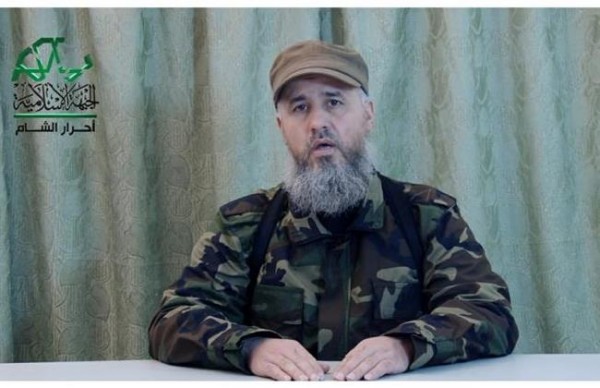
A powerful Islamist insurgent group said it pulled out of a Syrian opposition meeting in Riyadh on Thursday because rebel proposals had been ignored, in a move which highlighted the enduring divisions among President Bashar al-Assad’s enemies.
The conference of political activists and rebel groups in Saudi Arabia set up a joint body to prepare for proposed peace talks with Assad’s government which world powers proposed at a meeting in Vienna last month.
A statement at the end of the two-day conference said Assad should leave power at the start of a transitional period, and called for an all-inclusive, democratic civic state. It also committed to preserving state institutions.
But the Islamist Ahrar al-Sham group said it had pulled out of the talks, objecting to what it said was a prominent role given to the internal political opposition group, the National Coordination Body for Democratic Change (NCB). It said the NCB was considered to be a pro-Assad organization, not opposition.
It also said in a statement released on its Twitter account that the Saudi conference had not given “real weight to the revolutionary factions” either in terms of their representation at the talks or in the outcome.
Several opposition sources later said Ahrar al-Sham returned to the conference, but the group did not confirm the move.
The opposition was willing to enter talks with Syrian government representatives and to accept a U.N.-supervised ceasefire, the statement said.
If Ahrar al-Sham stayed outside the deal, its absence would make any such ceasefire much harder to implement.
Radical militant groups Islamic State and Nusra Front, al Qaeda’s Syria wing, were excluded from the Riyadh talks and would not be part of any cease-fire agreement.
CONFIDENCE-BUILDING
The meeting called on the United Nations to pressure the Syrian government to make a series of confidence-building moves before peace talks start, including suspending death sentences against opponents, releasing prisoners and lifting sieges.
The war pits the Syrian army and allied militias including Lebanese Hezbollah fighters backed by Iran and Russia, against an array of competing rebel and jihadi fighters, who include Arabs and Kurds.
Rifts among Assad’s opponents have hindered four years of Western efforts to mobilize a stronger political and military challenge to the president throughout a conflict which has killed 250,000 people and driven millions of refugees abroad.
The meeting came amid escalating conflict in Syria and accelerated diplomacy to find a political solution to the war.
Delegates from Islamist insurgent groups, exiled political opposition figures and Damascus-based activists gathered to bridge differences which have plagued previous attempts to unite Assad’s opponents around a common strategy.
Monzer Akbik, a member of the National Coalition opposition group, said the conference agreed to set up a 32-member secretariat to oversee and supervise peace talks. The statement said that body would select the negotiating team.
Participants also committed to a political system which “represents all sectors of the Syrian people”, and would not discriminate on religious or sectarian grounds – in a gesture towards minority Alawite, Christian and Kurdish populations.
U.S. Secretary of State John Kerry, speaking in Paris, said the Riyadh talks had made progress “but we have some tough issues to get over.” A possible Dec. 18 meeting to advance the Syrian peace talks in New York is “not locked in yet”, he added.
International efforts to resolve the conflict have been lent added urgency by a wave of deadly attacks across the world claimed by the Iraq- and Syria-based Islamic State and by the escalating refugee flow which has caused a crisis in Europe.
Major powers agreed in Vienna last month to revive diplomatic efforts to end the war, calling for peace talks to start by January and elections within two years.
NO PART FOR ASSAD
The demands that Assad and his lieutenants should play no part in the transition to democracy marked a tougher stance than several Western countries which back Assad’s opponents. The United States, France and Britain all called for Assad to step down after protests broke out against his rule in March 2011.
Although they all say Assad ultimately must go, they have been less specific about the timing of any departures, indicating that they could accept he stay in an interim period.
Assad’s fate was one of several questions left unresolved at the Vienna meeting last month which was attended by Russia, the United States, European and Middle Eastern countries including Saudi Arabia and Iran, which back opposing sides in Syria.
Saudi Arabia is a main backer of the rebels along with Turkey and Western countries. Iran and Russia support Assad.
Iran has openly criticized the decision by Saudi Arabia to hold the talks, saying they were designed to harm the Vienna process. On Thursday, Deputy Foreign Minister Hossein Amir-Abdollahian said some groups linked to the Islamic State militant group were involved in the Riyadh meeting.
Russia launched air strikes in Syria 10 weeks ago, helping the Syrian army – backed by Iranian troops, Hezbollah fighters and allied militia – to contain rebel advances.
Russia says it is bombing Islamic State militants, who control large areas of eastern Syria and western Iraq, but Western and Arab states which have been carrying out air strikes against Islamic State for more than a year say the Russia jets have mainly hit other rebel forces in the west of Syria.
Moscow’s intervention has not swung the war decisively Assad’s way and several Western-backed rebel groups, some of whom were represented in Riyadh, have been emboldened by the increased flow of foreign-supplied anti-tank missiles which have helped stem parts of the army’s counter-offensive.
Reuters

Leave a Reply
You must be logged in to post a comment.